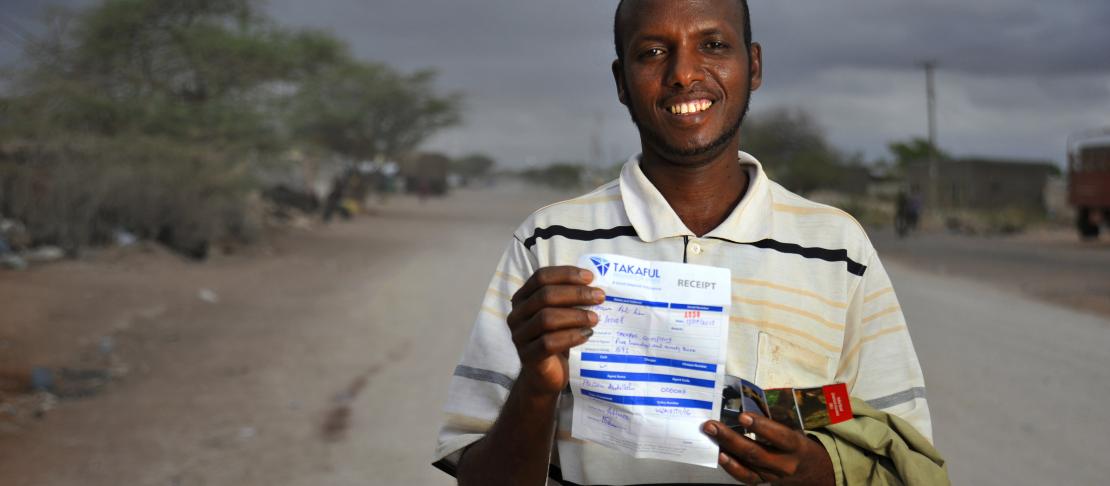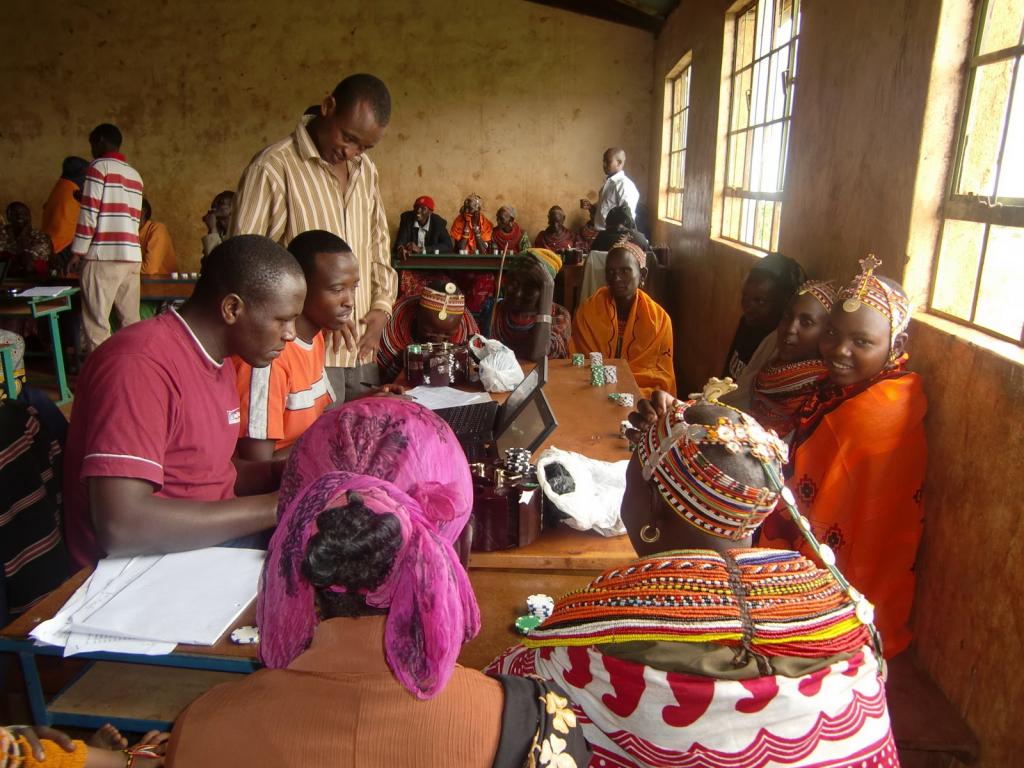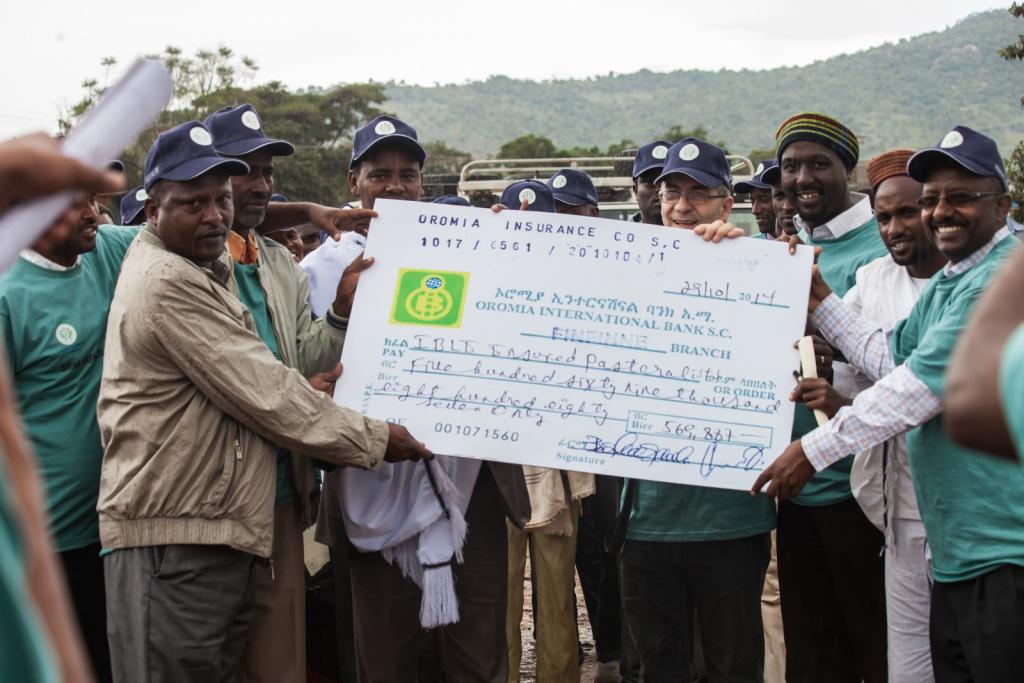Agricultural insurance innovations breathe new life into pastoralism in Ethiopia

In the drought-prone lowlands of Ethiopia, water is life. Livestock herders here rely on rainfall to nourish their livestock, with the first rains sending up green shoots through the cracked soils that will sustain their animals.
Because water is too scarce to use to irrigate these rangelands, rainfall is all-important to livestock well being. When the rains fail or become erratic, the vegetation disappears and the animals go hungry, getting thinner and weaker along with their owners, and putting livestock livelihoods’ as well as food and nutritional security here, at risk.
In developing countries, crop and livestock insurance in harsh climates is usually unavailable to small-scale farmers and herders. For insurance companies to examine loss claims among many small, widely dispersed and remote farms and herding communities makes their transaction costs prohibitively high. As a result, farmers and pastoralists are left without insurance, vulnerable to the whims of the weather.
A new ending to this story?
But innovations in science and technology are changing this. Through collaboration among the International Livestock Research Institute (ILRI), Cornell University, donor agencies such as the United States Agency for International Development (USAID), insurance companies, local radio stations, and pastoralists themselves, a new insurance system is being tested in Ethiopia—and this one works with the weather. ILRI’s Index-Based Livestock Insurance (IBLI) project in Ethiopia is funded by USAID and two CGIAR Research Programs: on Climate Change, Agriculture and Food Security (CCAFS) and on Dryland Systems.
Dramatic shifts in weather and climate can damage plant and animal production and—when any year could be a bad one—prevent farmers and livestock holders from investing in livelihood options that could lift them out of poverty. Weather index-based insurance represents a new method of lowering this risk and protecting livelihoods and food security while opening up new opportunities for small-scale farmers and livestock holders to prosper.
Index-based insurance takes its names from weather and climate signals, or “indices,” that influence agricultural and livestock production. In the case of the Index-Based Livestock Insurance (IBLI) project, satellite-based measurements of the forage quality in a given area are a good indicator of the condition of the livestock living there.
Specialists compare the total amount of forage available across a livestock insurance contract season with the historic average forage availability for that season. The bonus is that satellites can measure vegetation levels from space, providing the wide coverage over time and space that is needed to measure historical relationships and provide access to insurance policies to large numbers of pastoralists.
If forage falls below a certain level, the insurance policy will pay out to policyholders. Pastoralists can then use payouts to buy extra feed, medicine for their livestock, or take other measures to protect their livelihoods and feed their families.

Training livestock herders on index-based livestock insurance. Photo Credit: A. Mude/ILRI
Communicating science for development
While the IBLI project first launched in Northern Kenya in January 2010, it has operated since 2012 in Ethiopia as part of the CCAFS program. Researchers are carefully testing how well the insurance project works over time, figuring out the best ways to communicate with pastoralists, measure vegetation from space, and design insurance contracts.
The Borana region of Ethiopia experienced drought over the March-September 2014 season, and forage levels were down. Because the forage (or “index”) level indicating danger to livestock was reached, payouts were made to pastoralists in October. Right before the payout, the research team assessed how well the vegetation index matched up with pastoralists’ perceptions of forage levels.
A rapid assessment was conducted as to understand pastoralists’ perceptions of index measurements, and findings suggest that the response from pastoralists was very positive.
Their perception of forage levels matched up quite well with index measurements. This is a major milestone in terms of building trust among pastoralists and expanding usage of index insurance policies,” said Wako Gobu, IBLI Ethiopia Program Research Assistant.
Index insurance is not without its challenges. Communicating a complex insurance scheme with pastoralists and agro-pastoralists who may not be familiar with formal insurance or satellite remote sensing is no easy task. But the IBLI project has designed innovative methods of reaching pastoralists, responding to their expressed communications needs and enhancing their understanding of the project.
Community radio is very popular in the region, and is a key communication tool. The research team has been working with the insurance underwriters to design educational messages about the program, conveyed through local radio channels that community members already listen to on a regular basis.
After this education has occurred, announcements about the index and subsequently the insurance payouts are done over community loudspeakers beginning a month before payout.
Agricultural extension agents, who regularly interact with farmers and pastoralists in the region, also lend a hand in communicating about the program.
And the team is getting creative, too—even putting on skits at various gatherings and delivering entertaining radio bits to illustrate how the insurance scheme works.

An index insurance payout ceremony in oromia, Ethiopia. Photo Credit: Masresha taye/ILRI.
What does success look like?
As is the case in other development programs, the IBLI project team has a keen interest in measuring how well the project’s policies protect pastoralists. At the project’s outset, researchers collected “baseline” data through household surveys, gaining an understanding of indicators of well-being such as household-level consumption, education, health, and food security.
Because the variability of climate is increasing under climate change, it’s important to capture these outcomes in different kinds of years. Scientists repeat these surveys each year, measuring the impact that the insurance initiative has on these indicators over time.
Future directions
The IBLI project in Ethiopia has been working for three years. In the August-September 2013 sales window, 740 insurance policies were sold. Based on the trends of sales and November 2014's first payout, sales more than double those of the past sales window are expected for the January - February 2015 sales window.
One key question is whether index insurance can be a viable insurance product on its own, without assistance from research and development organizations. In the case of IBLI, the product is not yet profitable, but the insurance companies involved are expecting it to become so as adoption trends continue to rise.
Ultimately, the participation of insurance companies is an endorsement of the opportunity index insurance presents as a market-based solution that protects and enhances livelihoods and food security while turning a profit.
As the climate changes and grows more uncertain, pastoralists need this kind of protection more than ever. In this context, index insurance is not just an innovative science and development solution; it’s good business as well.
This story was written based on interviews conducted by Alexa Jay with Munenobu Ikegami – Economist, Rupsha R Banerjee – Postdoctoral fellow: Research and Training, Masresha Taye – Research Officer and IBLI Ethiopia Co-ordinator and Wako Gobu – Research Assistant
More details on the IBLI project, including its research outputs and socio-economic household-level survey data, are found at its web page: https://livestockinsurance.wordpress.com/
The IBLI project in Ethiopia is carried out as part of the CGIAR Research Programs on Climate Change, Agriculture and Food Security (CCAFS) and Dryland Systems, implemented on the ground by ILRI, Cornell University, and other collaborators. IBLI is one of several index insurance initiatives from around the world that CCAFS is studying to understand key issues for scaling up the schemes in new contexts.
For more information on index insurance innovations, check out these CCAFS blog stories.
Further reading:
Index Based Livestock Insurance (IBLI) Borena Household Survey Codebook
The subjective well-being effects of imperfect nsuirance that doesn’t pay out
Productive spillovers of the take-up of index-based livestock insurance
Quasi-experimental evidence on the drivers of index-based insurance demand in Southern Ethiopia
Alexa Jay is a Program and Communications Officer at CCAFS theme on Climate Risk Management.



